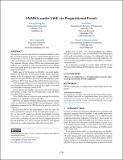| dc.contributor.author | Jin, Zhengzhong | |
| dc.contributor.author | Kalai, Yael | |
| dc.contributor.author | Lombardi, Alex | |
| dc.contributor.author | Vaikuntanathan, Vinod | |
| dc.date.accessioned | 2024-07-19T15:36:45Z | |
| dc.date.available | 2024-07-19T15:36:45Z | |
| dc.date.issued | 2024-06-10 | |
| dc.identifier.isbn | 979-8-4007-0383-6 | |
| dc.identifier.uri | https://hdl.handle.net/1721.1/155720 | |
| dc.description | STOC ’24, June 24–28, 2024, Vancouver, BC, Canada | en_US |
| dc.description.abstract | We construct a succinct non-interactive argument (SNARG) system
for every NP language L that has a propositional proof of nonmembership, i.e. of ∉ L. The soundness of our SNARG system
relies on the hardness of the learning with errors (LWE) problem.
The common reference string (CRS) in our construction grows
with the space required to verify the propositional proof, and the
size of the proof grows poly-logarithmically in the length of the
propositional proof.
Unlike most of the literature on SNARGs, our result implies
SNARGs for languages L with proof length shorter than logarithmic in the deterministic time complexity of L. Our SNARG
improves over prior SNARGs for such “hard” NP languages (Sahai
and Waters, STOC 2014, Jain and Jin, FOCS 2022) in several ways:
1) For languages with polynomial-length propositional proofs of
non-membership, our SNARGs are based on a single, polynomialtime falsi able assumption, namely LWE.
2) Our construction handles super-polynomial length propositional proofs, as long as they have bounded space, under the subexponential LWE assumption.
3) Our SNARGs have a transparent setup, meaning that no private
randomness is required to generate the CRS.
Moreover, our approach departs dramatically from these prior
works: we show how to design SNARGs for hard languages without
publishing a program (in the CRS) that has the power to verify NP
witnesses.
The key new idea in our construction is what we call a “locally unsatis able extension” of the NP veri cation circuit { } .
We say that an NP veri er has a locally unsatis able extension
if for every ∉ L, there exists an extension of that is not
even locally satis able in the sense of a local assignment generator
[Paneth-Rothblum, TCC 2017]. Crucially, we allow to be depend
arbitrarily on rather than being e ciently constructible. | en_US |
| dc.publisher | ACM|Proceedings of the 56th Annual ACM Symposium on Theory of Computing | en_US |
| dc.relation.isversionof | 10.1145/3618260.3649770 | en_US |
| dc.rights | Creative Commons Attribution-ShareAlike | en_US |
| dc.rights.uri | https://creativecommons.org/licenses/by-sa/4.0/ | en_US |
| dc.source | Association for Computing Machinery | en_US |
| dc.title | SNARGs under LWE via Propositional Proofs | en_US |
| dc.type | Article | en_US |
| dc.identifier.citation | Jin, Zhengzhong, Kalai, Yael, Lombardi, Alex and Vaikuntanathan, Vinod. 2024. "SNARGs under LWE via Propositional Proofs." | |
| dc.contributor.department | Massachusetts Institute of Technology. Department of Electrical Engineering and Computer Science | |
| dc.contributor.department | Massachusetts Institute of Technology. Computer Science and Artificial Intelligence Laboratory | |
| dc.identifier.mitlicense | PUBLISHER_CC | |
| dc.eprint.version | Final published version | en_US |
| dc.type.uri | http://purl.org/eprint/type/ConferencePaper | en_US |
| eprint.status | http://purl.org/eprint/status/NonPeerReviewed | en_US |
| dc.date.updated | 2024-07-01T07:51:38Z | |
| dc.language.rfc3066 | en | |
| dc.rights.holder | The author(s) | |
| dspace.date.submission | 2024-07-01T07:51:38Z | |
| mit.license | PUBLISHER_CC | |
| mit.metadata.status | Authority Work and Publication Information Needed | en_US |
